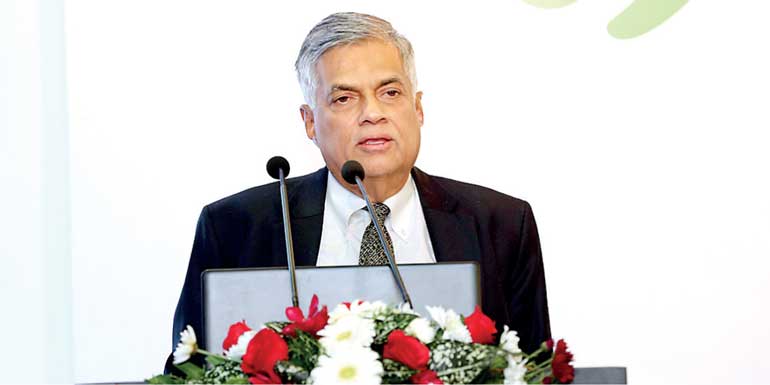Saturday Feb 21, 2026
Saturday Feb 21, 2026
Monday, 23 October 2017 00:00 - - {{hitsCtrl.values.hits}}

Prime Minister Ranil Wickremesinghe
Prime Minister Ranil Wickremesinghe on Friday said wide range of trade and tariff reforms will be implemented as part of measures to double exports to $ 20 billion per year within three years.
He referred to some of the reform measures during his economic policy statement made in Parliament ahead of the 2018 Budget which will be presented on 9 November.
Following are excerpts of Prime Minister’s comments with regard to trade and tariff reforms in the policy statement.
We were a trading nation since the era of ancient kings. Sri Lanka was the hub for transferring goods and knowledge from East to West, and West to East. We should learn from the history on exports and private sector growth which are key elements for becoming a higher middle-income economy.
People living in developed and developing East Asian and South East Asian countries such as China and Thailand have better jobs and higher living standards than the average Sri Lankans. I remember travelling to villages in these countries in 1979.
They did not have many comforts or western foods enjoyed by Sri Lankans by then.
But today, the situation is different. How Sri Lanka lost its pace of development while other countries were progressing? This is a question that we should ask from ourselves. They embraced open economic policies focused on exports. Meanwhile, we looked inwards and adopted closed policies.
Therefore we missed 30 years of valuable opportunities. As I said before, Sri Lanka’s exports are still based on traditional plantation crops together with apparels and tourism. We still compete for apparel with lower income economies resulting in pressure to keep our wages low. Still our biggest foreign exchange earner is foreign employment sector. Yet all these foreign exchange earnings are insufficient to meet our import bills. This lack of export growth contributes to the pressure on the balance of payments. This results in the depreciation of rupee and affects the prices of goods.
On the other hand, other middle-income countries such as Thailand and Vietnam are exporting a more diversified range of high-value products such as automobile parts, machinery and electronics. They are leaving us behind. We will have to catch up to our competitors. We have to change all these things if we are to strengthen the economy and to create more jobs.
We have obtained good results from the steps we have taken to stabilise the economy.
Therefore, we should now focus on adopting an export-led economical growth strategies and policies by providing high-value and diversified products and services.
A key part of this policy will be entering into Free Trade Agreements with partner countries around the world.
We are making great progress towards mutually beneficial Free Trade Agreements with Singapore, China, and India. These deals will give our economy a massive boost by opening huge new markets to our entrepreneurs.
We must ensure that both local manufacturers and export manufacturers are competitive through this export-led strategy. Businesses may have to restructure focusing on which aspects make them competitive. Only then Sri Lanka will become a highly competitive economy.
To ensure a smooth transition for these companies, the Government will be formulating a trade adjustment package.
We have already taken steps in that regard, enacting the Inland Revenue Act and the Foreign Exchange Act, and moving forward with the Anti-Dumping Bill. We are also formulating a new National Export Strategy and a new National Trade Policy.
The Government is also establishing a National Single Window for Trade facilitation, and creating a new development bank for development financing with an export-import window.